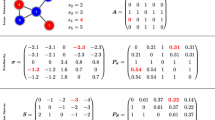Abstract
Semantic wikis have been regarded as a collaborative knowledge management system which can provide an efficient framework to foster social interactions and collaborations between online people synchronously. However, as such semantic wiki systems allow users to exploit their own semantics for describing their knowledge, there are sometime conflicts between knowledge (or information) published by them. Thereby, the goal of this work is i) to automatically detect such conflicts by monitoring the user semantics and ii) to reasonably determine consensus choice converged by analyzing social collaborations. In this paper, we want to note major patterns of knowledge dynamics and conflicts through the social interactions on semantic wikis. The consensus choice is effectively selected to be recommended for better understandability about the knowledge conflicts.
Preview
Unable to display preview. Download preview PDF.
Similar content being viewed by others
References
Cayzer, S.: Semantic blogging for bibliographies - lessons learnt. Deliverable 12.1.4, SWAD-Europe (2001)
Schaffert, S., Bry, F., Baumeister, J., Kiesel, M.: Semantic wikis. IEEE Software 25(4), 8–11 (2008)
Souzis, A.: Building a semantic wiki. IEEE Intelligent Systems 20(5), 87–91 (2005)
Goodfellow, T., Graham, S.: The blog as a high-impact institutional communication tool. The Electronic Library 25(4), 395–400 (2007)
Jung, J.J.: Social grid platform for collaborative online learning on blogosphere: a case study of eLearning@BlogGrid. Expert Systems with Applications 36(2), 2177–2186 (2009)
Noy, N.F., Chugh, A., Alani, H.: The ckc challenge: Exploring tools for collaborative knowledge construction. IEEE Intelligent Systems 23(1), 64–68 (2008)
Jung, J.J.: Trustworthy knowledge diffusion model based on risk discovery on peer-to-peer networks. Expert Systems with Applications 36(3), 7123–7128 (2009)
Nguyen, N.T., Sobecki, J.: Consensus versus conicts - methodology and applications. In: Wang, G., Liu, Q., Yao, Y., Skowron, A. (eds.) RSFDGrC 2003. LNCS (LNAI), vol. 2639, pp. 565–572. Springer, Heidelberg (2003)
Danilowicz, C., Nguyen, N.T.: Consensus methods for solving inconsistency of replicated data in distributed systems. Distributed and Parallel Databases 14(1), 53–69 (2003)
Nguyen, N.T.: Using distance functions to solve representation choice problems. Fundamenta Informaticae 48(4), 295–314 (2001)
Nguyen, N.T.: Consensus system for solving conicts in distributed systems. Information Sciences 147(1-4), 91–122 (2002)
Schapire, R., Freud, Y., Bartlett, P., Lee, W.: Boosting the margin: a new explanation for the effectiveness of voting methods. The Annals of Statistics 26(5), 1651–1686 (1998)
Saaty, T.L., Shang, J.S.: Group decision-making: Head-count versus intensity of preference. Socio-Economic Planning Sciences 41(1), 22–37 (2007)
Author information
Authors and Affiliations
Editor information
Editors and Affiliations
Rights and permissions
Copyright information
© 2009 Springer-Verlag Berlin Heidelberg
About this paper
Cite this paper
Jung, J.J., Nguyen, N.T. (2009). Consensus Choice for Reconciling Social Collaborations on Semantic Wikis. In: Nguyen, N.T., Kowalczyk, R., Chen, SM. (eds) Computational Collective Intelligence. Semantic Web, Social Networks and Multiagent Systems. ICCCI 2009. Lecture Notes in Computer Science(), vol 5796. Springer, Berlin, Heidelberg. https://doi.org/10.1007/978-3-642-04441-0_41
Download citation
DOI: https://doi.org/10.1007/978-3-642-04441-0_41
Publisher Name: Springer, Berlin, Heidelberg
Print ISBN: 978-3-642-04440-3
Online ISBN: 978-3-642-04441-0
eBook Packages: Computer ScienceComputer Science (R0)




